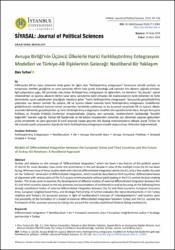Models of differentiated integration between the European Union and Third Countries and the future of Turkey-EU relations: a neoliberal approach
Abstract
Studies and debates on the concept of "differentiatedintegration," which has been a key feature of the political system of the EU for many decades, have come into prominence in the last decade in view of the multiple crises the EU has been facing. Whereas most of these studies dealt with internal differentiated integration within the EU, only a few studies focused on the "external" dimension of differentiated integration, which could be described as third countries' differentiated levels of alignment with various parts of the EU's acquis communautaire without participating in the EU's central decision-making bodies. This study seeks to examine the development of different models of external differentiated integration between the EU and third countries based on the key premises and assumptions of neoliberalism and by focusing on the following three already established modes of external differentiated integration between the EU and third countries: European Economic Area, European neighborhood Policy, and Strategic Partnership. It further evaluates the latest developments in EU-Turkey relations and Turkey's EU accession process in light of neoliberalism's concept of "interdependence" and touches upon the possibility of the formation of a model of external differentiated integration between Turkey and the EU, outside the framework of the accession process by taking into account the recently established bilateral dialog mechanisms.

















